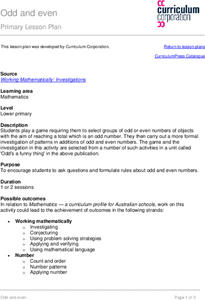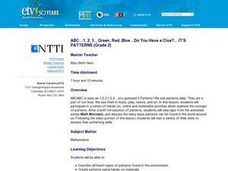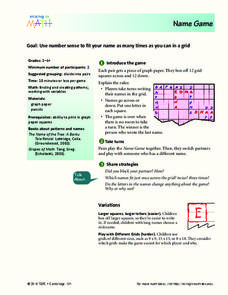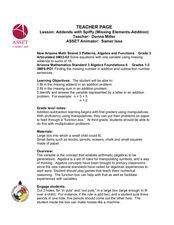Curated OER
Sequences
Provide your class with a comprehensive set of examples that help define sequences. They view a wide variety of sequences that range from animals, to letters and sounds. They work through each sequence to determine what should come next....
Alabama Learning Exchange
Musical Patterns
Young scholars explore the concept of patterning using musical instruments. In this music lesson, students identify several instruments and practice playing patterns with them. Young scholars identify the patterning in a musical piece.
Curated OER
Boxes of Patterns- Following the Rule in Addition and Subtraction Patterns
For this addition and subtraction pattern enrichment worksheet, 2nd graders follow the given rule to fill in the pattern boxes. They examine the patterns as they add and subtract with two digit numbers, and write a sentence telling what...
Curated OER
Algebra: What's My Rule?
Students apply higher level thinking skills to determine rules for sorting and classification. In this pre-algebra lesson, students nominate classmates who they think satisfy the unspoken "rule" established by the leader. As students are...
Curated OER
What Is the Rule?
In this math tables worksheet, students complete 4 blanks in a math table in which two digit numbers are added. Students determine the pattern and write the rule. There are four tables on the page.
Curated OER
Number Sequence Rules
In this number sequence interactive worksheet, learners fill in the missing numbers in each of the 14 number sequences. There are three numbers missing in each number sequence.
Curated OER
Odd and even
Learners play a game requiring them to select groups of odd or even numbers of objects with the aim of reaching a total which is an odd number. They carry out a more formal investigation of patterns in additions of odd and even numbers.
Curated OER
Add It Up In Number Ville! Adding 2-Digit Numbers With and Without Regrouping
Students explore adding 2-digit numbers. In this math lesson, students identify 2-digit numbers and use base ten blocks to practice adding. Students use addition to break a code.
Curated OER
Cannon Balls
Second graders investigate 2 and 3 dimensional objects. They discuss the characteristics of the triangle. Students create sequential patterns and describe the rule for their pattern.
Curated OER
ABC...1, 2, 3...Green, Red, Blue...Do You Have a Clue?... IT'S PATTERNS
Second graders view clips from the animated series Math Monsters, and discuss the many ways patterns can be found in the world around us. Following the video portion of the lesson, 2nd graders visit a variety of Web sites to assess their...
Curated OER
Sort it Out
Learners identify and sort a variety of two- and three-dimensional objects and compare and contrast their attributes. They identify shapes, locate shapes on the faces of solids, sort real objects and explain the sorting rule, and...
Curated OER
Using Graphs and Charts
Students complete T charts and manipulate numbers using graphs and charts. In this math graphs and charts lesson, students review the concepts of pattern and function. Students then complete practice pages where they manipulate numbers...
Curated OER
Fact-O!
Learners practice math facts as they play a game of chance and skill. They correctly create and calculate mathematical equations, using the numbers rolled on three dice, and earn points for marking adjacent numbers on the game sheet.
Curated OER
Treasure to Ship
Second graders explore and solve an algebraic word problem. They listen to a poem about pirates, describe the word problem in their own words, and independently solve the problem using colored rods to represent the pirates and treasure...
Curated OER
Supermarket Displays
Second graders look at the number patterns created when cans are stacked in different arrangements. The aim of the unit is for students to keep track of the numbers involved by drawing up a table of values. They are then encouraged to...
Curated OER
Same As
Explore the concept of the equals symbol. In this mathematical symbols activity, learners discover the meaning of the equals sign (symbol). They also construct addition and subtraction sentences to understand the concept of equal parts.
Curated OER
Function Machine
Second graders decipher a pattern using input and output. In this functions lesson, 2nd graders use input and output numbers to find a pattern involving addition and subtraction. Students use the pattern they discovered to help solve...
Curated OER
Four Fours Challenge
Second graders look at the number patterns created when tins are stacked in different arrangements. The aim of the unit is for students to keep track of the numbers involved by drawing up a table of values. They are then encouraged to...
Curated OER
Chessboard Challenge
Second graders read "The King's Chessboard" by David Birch. The teacher reads the story aloud and pauses at several points for students to calculate the next number in a pattern of doubling.
Curated OER
Jo's Table
Second graders work on the problem with a partner. They examine what they are supposed to be doing. They share the students's solutions making sure than they are looking for patterns along the diagonals.
Curated OER
Taxi Fare
Students discuss what they know about taxis and how they charge. They read the problem and work in pairs focusing their thinking on the repeating pattern of twos. They then share their solutions and conclude with some class practice...
Curated OER
Technology in 2nd Grade
Second graders explore ways to use computers. They practice spelling words using Kid Pix software, write Bible verses and illustrate them. They read stories and illustrate and write about their favorite characters. They create pattern...
Curated OER
Name Game
Students practice writing names using a Scrabble type activity. For this letter writing lesson, students participate in a name writing game in which they must utilize other student names to spell their own on the same grid....
Curated OER
Addends with Spiffy
Young scholars solve single variable equations. In this missing addend lesson, students solve problems with missing addends. Young scholars create a function box to help study numerical reasoning.























